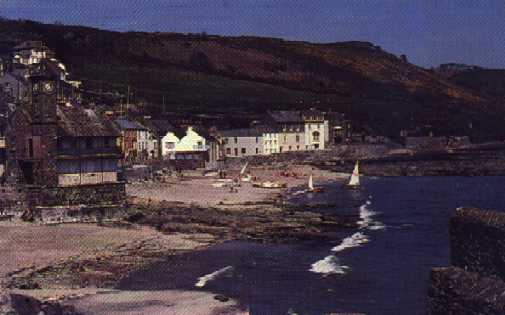|
|
|
Cornwall and smuggling go together like bacon and eggs. It went on and was ignored by everyone but the law until the 19th century. Because there is so much rugged coastline small ships could come ashore almost anywhere to land their bounty and other vessels were shipwrecked and then looted. Smuggling started because of the dues that were levied on incoming goods in the early Middle Ages.
Most of the villagers would be in on the act and those that weren't would turn their faces to the wall when the smugglers passed by so that they knew nothing if asked by the Law.
The most popularly smuggled goods were tea, spirits, silks and china and these found an easy market for resale. In 1784 it was estimated that over half of the tea consumed annually in Britain was smuggled in.
Penzance, Polperro, Falmouth and Looe were favourite landing points, sometimes the customs officers having been bribed or threatened to deal with the untaxed goods. The law at the time made it an offence to smuggle goods but it wasn't a crime to sell them on, so smugglers would often leave their wares in a cave to be fetched by another person who would not be committing a crime by selling them.
Smugglers would often be armed with pistols and cudgels and often out-numbered the soldiers and customs officers sent to capture them. Using the threat of force the smugglers would escape capture and as one official once put it, 'even if we did catch them and prosecute them, no Cornish jury would ever find them guilty.' On the rare occasion that a smuggler was caught and convicted his boat would be seized and sawn into three, then sold for firewood, with her equipment and cargo.
Smugglers often frequented public houses (inns) and there were usually several ways out of it so that the kings' men couldn't catch them. Old farmhouses sometimes had secret panels and tunnels leading to the cliffs and hidey-holes where smuggled goods could be stored, waiting for a safe time to transport them to their final destination.
In the 1700's so many men were involved in smuggling that the boats used to land their contraband on the beaches or harbour quays in broad daylight, never bothering to conceal it. As time passed and the law clamped down harder goods would be hidden aboard ship, often behind false bulkheads and decks. The ship's water-tank was also a favourite.


Cawsand Bay

The place most likely to win the award for having had the most smuggled goods pass through would probably fall to a small village near Plymouth called Cawsand. It provided a safe anchorage and even Lord Nelson stayed at the local Ship Inn, not in the course of any smuggling activities though! Cawsand also had a thriving pilchard industry when the boats weren't being used for illicit purposes.
Cornwall at this time was very poor and transporting goods over land was very expensive meaning that to make a profit contraband had to be sold locally, and Plymouth was one of the largest towns in the region. The people of Plymouth were a ready market for the smuggled goods. Brought in by small, fast boats, the liquor would be carried by women, in bladders under their petticoats, and they were often so heavily laden that their bodies seemed deformed, waddling rather than walking.

In Mylor churchyard there are two graves of smugglers.
One epitaph is here, the other on the epitaph page
This is the memorial of Robert Mark, late of Polperro who was shot at sea on 24/1/1802 when he was 40 years old.
In prime of life most suddenly,
Sad tidings to relate;
Here View My utter destiny,
And pity, My sad state:
I by, a shot, which Rapid flew,
Was instantly struck dead;
Lord pardon the Offender who
My precious blood did shed.
Grant him to rest, and forgive Me,
All I have done amiss.